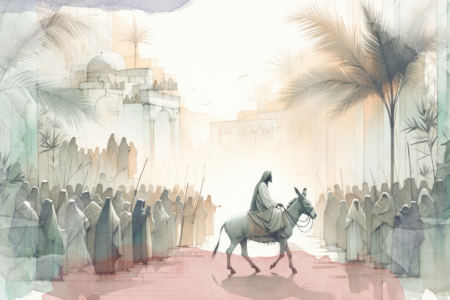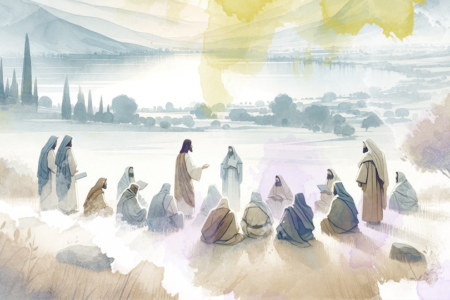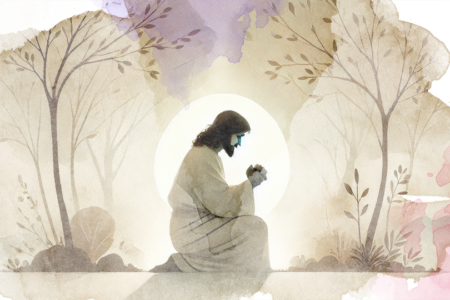The Life, Times And Message Of Isaiah The Prophet Oct/Nov 1973
PIOUSNESS WITHOUT COMPASSION IS UNACCEPTABLE TO THE LORD
ISAIAH CHAPTER 58
1 Shout at the top of thy voice, hold not back,
Lift up thy voice like a trumpet,
And tell My people their transgressions,
And the house of Jacob their sins.
3 Yet they seek Me day by day,
And delight to know My ways,
Like a nation which acts righteously,
And has not forsaken the judgment of their God:
They inquire of Me about righteous judgments,
And delight to draw near unto God.
3 ‘Why do we fast and Thou seest not?
Why do we afflict ourselves and Thou payest no heed?’
Behold on the day of your fast you pursue your pleasure,
And enforce all your labors.
4 Behold, you fast for strife and contention,
And to deal blows with a vicious fist.
Such a day of fasting will not cause your voice to be heard above.
5 Is this the fast which I have chosen?
A day in which a man afflicts his soul,
And bows down his head like a reed,
And puts sackcloth and ashes under himself?
A day which is acceptable to the LORD?
6 Is not rather this a fast which I have chosen:
To loose the fetters of wickedness,
To undo the bands of the yoke,
To let the oppressed go free,
And to break every yoke?
7 Is it not rather a day to distribute thy bread to the hungry,
And to bring home the poor wanderer?
When thou seest the naked to cover him,
And that thou hide not thyself from thy own flesh?
8 Then shall thy light break forth as the dawn,
And thou shall be healed quickly,
And thy righteousness shall go before thee,
And the glory of the LORD shall be thy rearguard.
9 Then wilt thou call and the LORD will answer,
Thou shalt cry and He will say: ‘Here I am,’
If thou wilt remove the yoke from thy midst,
If thou wilt cease to point a finger and to speak wickedness.
10 If thy soul will go out in compassion and bestow thy bread on the hungry
To satisfy the afflicted soul,
Then shall thy light shine forth in darkness,
And the dusk will be like noonday.
11 And the LORD will guide thee continually,
And satisfy thy soul in drought,
He will strengthen thy bones,
And thou shalt be like a well-watered garden,
And like a spring, whose waters never fail.
12 Then shall thy own rebuild the old ruins,
And raise up the ancient foundations,
And thou shalt be called ‘a breach mender’
And ‘restorer of ruined paths for habitation.’
13 If thou wilt withhold thy foot from the Sabbath,
To do thy pleasure on My holy day,
But wilt call My Sabbath a delight,
And the LORD’S holy day a day to be honored,
And honor it by not pursuing your own affairs,
Or doing whatever pleases you, nor talking business on it.
14 Then shalt thou delight thyself in the LORD,
And I will cause thee to ride upon the high places of the earth,
And I will feed thee with the heritage of thy father Jacob,
For the mouth of the LORD has spoken this.
Comment:
1 Shout at the top of thy voice, hold not back
Literally, “with a full throat, spare not”.
Lift up thy voice like a trumpet
The Hebrew word for trumpet or horn, is “shofar” – a ram’s horn used by the priests to call the people to a solemn assembly, or by a military commander to sound the signal for alarm or for action.
In like manner the prophet is commanded to sound the trumpet to warn his people of the imminent danger of apostasy, in spite of all the superficial manifestations of piety.
2 Yet they seek Me day by day and delight to know My ways
Even while they are grievously offending God and provoke Him to wrath, the people act as if they were truly seeking God and delight to know His ways. They are not even conscious of their hypocrisy, because they have convinced themselves that to know the LORD and to serve Him is simply a matter of a scrupulous observance of certain religious procedures.
They inquire of Me about righteous judgments
And delight to draw near unto God
They are anxious to know about all the right procedures and even to draw near to God in some way which does not affect a complete change of heart, or impose on them the demand of a new relationship to their fellow men, and does not affect their personal possessions. This great intellectual curiosity about “God’s righteous judgments” has in time produced an involved, voluminous speculative literature, The Talmud, which dealt with all the minutia of proper religious behavior and procedures and rites, affecting the daily life of “the good Jew” from morning till evening and from cradle to grave. However, it did little to change the hearts of men. We recall the words of Jesus when asked about the most important commandment of the Law, and His answer, “thou shalt love the Lord thy God with all thy heart and with all thy soul and with all thy mind. This is the first and the greatest commandment.
“And the second is like unto it, thou shalt love thy neighbor as thyself. On these two commandments hang all the law and the prophets.” Matthew 22:37-40.
3 “Why do we fast and Thou seest not?”
Believing that they were scrupulous in seeking to do the will of God, they felt aggrieved and wronged that God did not hear their prayers and did not take notice of their fasting, without realizing that their religious life did not affect their moral behavior.
3b-5 The Lord’s answer to the complaint of the people.
3b Behold on the day of your fast you pursue your pleasure
Their fasting is not the result of true contrition, but mere compliance with the Law and tradition. In reality their thoughts were far removed from God and absorbed with their own business and pleasure. Even on their fast day, they exacted from their servants all the labors which have been imposed on them.
4 Behold you fast for strife and contention and to deal blows with a vicious fist
Outwardly pious, in reality their conduct was ungodly and cruel. Such was the Lord’s severe indictment against His people. The moral and social scene described by the prophet is extremely dark. However, we must be careful not to transfer the situation described by the prophet on the Jewish people of today. The holy and righteous God is the judge of all men. He judges men according to His infinite mercy and justice, whether they be Jews or non-Jews. The prophet makes the point that physical fasting, devoid of repentance and mercy, will not be heard by God.
5 Is this the fast which I have chosen . . . a day which is acceptable to the LORD?
Having, made abundantly clear that the Lord despises all sham piety, the prophet now proceeds to describe what the Lord does desire of those who are His.
6 To loose the fetters of wickedness, to undo the bands of the yoke . . .
And to break every yoke
It is ringing challenge not only to Israel but to men of all generations to be done with outward appearances and to set free those who are crushed and oppressed and to break every yoke.
7 Is it not rather a day to distribute thy bread to the hungry
And to bring home the poor wanderer?
The deeds of mercy which are acceptable to the Lord are spelled out in challenging detail. Isaiah’s pronouncement reminds us of the words of Christ in which He identified Himself with all the sufferers and distressed:
“I was hungry and ye gave me meat, . . . Thirsty and ye gave me drink, . . . a stranger and ye took me in . . . naked and ye clothed me . . . sick and ye visited me . . . in prison and ye came unto me.” Mt. 25:35-36
There is more of Isaiah in the Gospels than we generally realize. For Christ was saturated with the knowledge and the spirit of the prophets.
8 Then shall thy light break forth as the dawn and thou shalt be healed quickly
God’s favor and blessing are contingent upon a man seeking to do what is acceptable to Him. “Thy light” is contrasted with the darkness of a sinful heart and mind. “Thy healing” is physical health and renewal of strength which comes from living in harmony with God. “Thy righteousness” is the righteousness of obedience to the will of God. It is the righteousness of faith. Faith and action must go together.
11 And the Lord will guide thee continually, and satisfy thy soul in drought
And thou shalt be like a well-watered garden. . .
One of the most beautiful promises made to the true servant of God: The Lord’s continuous guidance and a never-failing spring of divine resources. Here again we recall the words of Jesus spoken to the woman of Samaria:
“Whosoever drinketh of the water that I shall give him, shall never thirst, but the water that I shall give him shall be in him a well of water springing up into everlasting life.” John 4:14
12 Then shall thy own rebuild the old ruins . . .
And thou shalt be called ‘a breach mender’ and ‘restorer of ruined paths’ . . .
The blessings of God will also be poured out not only on the penitent person alone, but on the penitent nation. This will manifest itself in the reclamation of the ancient ruins, so that they will become known as a nation of ‘breach menders’ and ‘restorers of ruined paths.’
13 If thou wilt withhold thy foot from the Sabbath to do thy pleasure on My holy day
The importance of the keeping of the Sabbath is repeatedly emphasized by the prophet, as a visible acknowledgement of the sovereignty of Jehovah, as Lord of our lives and of our time. The Sabbath was of particular importance to Israel in exile as a unifying and sanctifying force, and has remained such throughout the ages.
But wilt call my Sabbath a delight and the LORD’S holy day a day to be honored
When the children of Israel shall observe the Sabbath not merely as a burden, the Sabbath will become a delight to them. It has been said by a Jewish sage: “More than the Jews kept the Sabbath, the Sabbath kept the Jews.”1
14 Then . . . will I cause thee to ride upon the high places of the earth
The honoring of the Sabbath and of the LORD who sanctified the Sabbath will bring exaltation and honor to Israel from the nations of the earth, also restoration and enjoyment of their ancestral heritage.
For the mouth of the LORD has spoken this
A most solemn declaration that the promise does not originate from a human source but from the very mouth of God.
1 For a fuller discussion of the relationship of the Christian to the Sabbath, see The Gospel In The Feasts of Israel by Victor Buksbazen, published by The Spearhead Press, W. Collingswood, New Jersey.
ISRAEL’S SINS STAND BETWEEN HER AND JEHOVAH
ISAIAH CHAPTER 59
1 Behold the hand of the LORD
Is not so short that it cannot save,
Neither is His ear so dull that it cannot hear.
2 But your iniquities, these have separated you from your God,
And your sins have caused His face to hide from you,
So as not to hear.
3 For your hands are stained with blood,
And your fingers with iniquity.
Your lips have spoken lies,
And your tongues have uttered wickedness,
4 There is none who sues justly,
And none is judged faithfully.
They trust in vanity and speak lies.
They conceive mischief and bring forth iniquity.
5 They hatch adders’ eggs and weave a spider’s web,
He who eats of their eggs will die,
And that which is crushed hatches a viper.
6 Their webs shall not be made into a garment,
Neither shall men cover themselves with their works.
Their works are works of evil,
And violence is in their palms.
7 Their feet run to do evil,
And they hasten to shed innocent blood.
Their thoughts are thoughts of iniquity,
Desolation and ruin are in their paths.
8 They know not the way of peace,
Neither is there justice in their tracks.
They have perverted their paths,
Whosoever follows them knows no peace.
9 This is why justice is far from us,
And righteousness does not reach us,
We wait for light, and behold darkness
For brightness, — but we walk in gloom.
10 We grope along the wall like the blind
And feel our way like sightless men.
We stumble at noonday as if it were twilight
And like the dead we dwell in the dark.
11 We all growl like bears
And we keep moaning like doves.
We look for justice, but there is none.
For salvation, but it is far from us.
12 For our transgressions against Thee are many,
And our sins bear witness against us,
For our transgressions are with us
And we know our iniquities.
13 Rebelling and denying the LORD
And turning away from following our God,
Speaking oppression and revolt,
Conceiving and uttering words of falsehood from our hearts.
14 And justice has been turned back,
And righteousness stands afar off,
For truth has stumbled in the broad street,
And fairness cannot enter.
15 So truth is missing,
And he who avoids evil is plundered,
And the LORD saw this and it appeared evil in His eyes
That there was no justice.
16 For He saw that there was no man,
And He was amazed that there was no intercessor,
Therefore, His own arm brought Him salvation,
And His righteousness sustained Him.
17 He clothed Himself with righteousness as a breast plate,
The helmet of salvation on His head.
He put on the garment of vengeance for His clothing
And wrapped Himself with zeal as with a robe.
18 According to their deeds so will He repay.
Wrath to His adversaries, retribution to His enemies
To the inhabitants of the islands He will repay as they deserve.
19 And they, from the West, shall fear the name of the LORD
And from the East, His glory
For distress shall come like a pent up stream
Driven by the spirit of the LORD.
20 And the Redeemer shall come to Zion,
And to those in Jacob who turn away from transgression,
Says the LORD.
21 And as for Me: this is My covenant with thee, says the LORD.
My spirit which is upon thee,
And the words which I have put in thy mouth,
They shall not depart from thy mouth,
Nor from the mouths of thy seed,
Nor from the mouths of thy seed’s seed,
Says the LORD, from now on and for ever.
Comment:
1-8 Israel’s sinful condition has separated her from God
1 Behold, the hand of the LORD is not so short
The reason why God does not come to Israel’s rescue is not His inability to help (the hand too short), nor is it His indifference (a dull ear).
2 But your iniquities, these have separated you from your God
The enormous sins of the people have formed a barrier between them and their God.
3 For your hands are stained with blood
From a general indictment the prophet proceeds to point out specific sins. The first is the shedding of innocent blood. The same accusation is mentioned in chapter 1:15. Their fingers are defiled with iniquity, an allusion to wicked manipulations and schemes.
Their lips speak lies, their tongues are used for wickedness. There is no truth in daily communications between the people.
4 There is none who sues justly and none is judged faithfully
The judicial process is perverted by the litigants and by the judges.
They conceive mischief and bring forth iniquity
When the mind is perverted, what comes out of it can only be iniquity.
5 They hatch adders’ eggs and weave a spider’s web
In these two figures the prophet aptly describes the prevailing corruption among the people. Adders’ eggs are poisonous and dangerous, and no garment can be made of the flimsy web of a spider (v. 6).
7 Their feet run to do evil, and they hasten to shed innocent blood
Just as they are slow in doing justice (v. 4), they are quick to do evil and to shed innocent blood.
8 They know not the way of peace . . . They have perverted their paths
In effect the prophet accuses his compatriots that they have perverted and twisted their path and lost the way of peace. The Hebrew term for peace – shalom, as we have already pointed out, is a much more encompassing term than our word ”peace”. Shalom means harmony between man and his neighbor, peace within and peace with God. Isaiah accuses his people that they have so perverted all social, personal and national relationships that “shalom” has become impossible. The prophet draws a bleak picture of the moral scene, which is strongly reminiscent of Isaiah ch. 1.
9-11 The lamentable consequences of moral corruption
9 This is why justice is far from us
Under the conditions so vividly described by the prophet there can be no justice, but constant frustration and disappointment.
We wait for light, and behold darkness
One feels the constant sense of frustration of the helpless victims of injustice who wait for a glimmer of light amidst the night of darkness which refuses to pass.
10 We grope along the wall like the blind
The prophet further enlarges on what he said in v. 9. Without the evidence of the God-revealed righteousness, the people are like the blind who grope along the walls. This is a striking picture familiar to the inhabitants of Jerusalem where blindness was such a frequent and pathetic occurrence.
11 We all growl like bears and we keep moaning like doves
In a double metaphor the prophet compares the complaining and lamenting people, the victims of their own domestic oppressors, to the growling of bears which in the days of Isaiah must have been quite numerous in the land, and to the mournful cooing of the doves.
12-15 The confessions of a repentant people.
12 For our transgressions against Thee are many
A righteous remnant in Israel was keenly aware of the sinful condition of their people and confessed to God on behalf of their compatriots. It is also possible that the prophet himself, identifying himself with his people, confesses their sin. All sins which a man commits against men are basically sins against the holiness and righteousness of God Himself (Ps. 51:4).
13 Rebelling and denying the LORD
From specific transgressions the prophet goes on to the roots of the sinful conditions which are in the hearts and minds of the people: rebelling and denying God, ceasing to follow Him, scheming rebellion in their hearts and speaking all kinds of falsehoods.
14 And justice has been turned back and righteousness stands afar off
The prophet sees justice, righteousness, truth and fairness as living persons, who were assaulted by wicked men, wounded in the main street (rehov), and forbidden to enter the city.
15 So truth is missing
The prophet continues his metaphors and sees truth as a missing person, and those who do not join the wicked majority, or their leaders, as exposed to plunder and injustice.
And the LORD saw this and it appeared evil in His eyes
From v. 15a-18, the outraged God intervenes to punish the wicked and to restore justice.
16 For He saw that there was no man
The Lord waited for a man worthy of the name, who would come and restore righteousness and punish the wicked, but there was none.
Therefore, His own arm brought Him salvation
As there was no man to stand up for the cause of justice, the LORD Himself decided to intervene. “The Arm of the LORD” symbolizes God in His mighty acts of salvation (Isa. 53:1). 17 He clothed Himself with righteousness as a breast plate.
The Lord is presented as a mighty man of war, attired as a warrior to do battle with the enemies of righteousness. He is depicted like an ancient warrior with the breastplate (shirion), or coat of mail, for protection from the swords and darts of His enemies. His head is covered with the helmet of salvation, and the garment of vengeance covers His body. For His outside tunic, He wears His zeal, (compare Eph. 6:10-17).
18 According to their deeds so will He repay:
Wrath to His adversaries, retribution to His enemies
It now becomes apparent that the adversaries and enemies of God are not only the wicked of Israel, but also “the inhabitants of the islands”, the heathen nations who are the enemies of His people and also of His righteousness.
The Apostle Paul dealing with this same theme said that God is no respecter of persons, but judges the Jews according to the divine revelation which they have received, and the Gentiles who are outside the Law according to their innate sense of right and wrong (Rom. 2:11-15).
19-21 The consequences resulting from God’s judgment upon the nations and upon Israel.
19 And they, from the West, shall fear the name of the Lord
And from the East, His glory
“To fear the name of the LORD,” is not abject terror but a reverential awe before the majesty, omnipotence and holiness of God.
For distress shall come like a pent up stream driven by the spirit of the LORD
God manifests himself in history and in nature in cataclysmic acts which reveal Him as Creator and Sustainer of the universe and as Judge of all men and nations.
20 And the Redeemer shall come to Zion
When judgment shall come upon the nations of the world, the Lord will send the Redeemer to Israel. The advent of the Redeemer is not further defined as to time and circumstances, except that He will come “to those who turn away from transgressions,” that is, to a repentant remnant.
21 And as for Me: this is My covenant with them, says the LORD
God’s covenant with them, that is, His people, is the promise that the Spirit of God manifested in His revelation to Israel shall remain with His people throughout the coming generations. “The covenant” has nothing to do with the merits or disobedience of Israel. It is an act of the sovereign will and grace of God. Israel is destined to remain forever His witness whether in obedience or disobedience, the custodian of His word.1
ENDNOTE
1 It should be emphasized that this and the following chapters (60-62) are addressed to Israel and not to the Church of Christ, as many Christian commentators have falsely maintained. To apply this to the Church and not to Israel is to obfuscate and distort the plain sense of the Scriptures. This unfortunate practice of confusing Israel with the Church started in the early centuries and was later followed by most of the Reformers and commentators. This misinterpretation had its roots in the teaching that Israel by rejecting Christ has forfeited her election and promises of future blessings, which were inherited by the Church, “the New Israel”.






